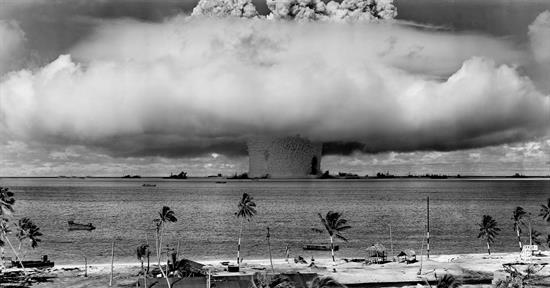Reps. McGovern, Blumenauer Introduce Legislation in Support of Nuclear Disarmament
Washington,
April 12, 2019
WASHINGTON, D.C. – Yesterday, U.S. Congressmen James McGovern (D-MA) and Earl Blumenauer (D-OR) introduced H. Res. 302, a resolution on the prohibition of nuclear weapons, calling on the federal government and the American people to work towards reducing and ultimately eliminating nuclear weapons, rejecting first strike and first use of nuclear weapons, and canceling the trillion dollar program to upgrade and modernize the U.S. nuclear arsenal.
The resolution also calls on the President and Secretaries of State and Defense to embrace the goals and provisions of the Treaty on the Prohibition of Nuclear Weapons, which calls for the elimination of all nuclear weapons and was signed by 122 nations at the United Nations on July 7, 2017. It was the first ever legally binding international agreement to prohibit and eliminate all nuclear weapons. “There is simply no reason for the United States – or any country – to possess nuclear weapons,” said Congressman McGovern. “Our world has made real progress toward peace in the last century, yet nuclear weapons continue to keep us tethered to a dark and dangerous past. Maintaining our nuclear arsenal costs billions of dollars that should be spent on the American people, not on preparing for a nuclear war which would threaten the existence of humanity. At the end of the day, either we must put an end to nuclear weapons – or they will put an end to us.” “No one can imagine a situation in today’s world where we’d need to use a nuclear weapon, nor can we afford them,” said Congressman Blumenauer. The mere existence of these weapons should scare all of us, and the consequences of their use are disastrous. For the betterment of all people, these outdated cold-war weapons should be relegated to the dustbins of history in favor of a nuclear-free future.” Since the height of the Cold War, the United States and Russia have dismantled more than 50,000 nuclear warheads, but 14,500 of these weapons still exist worldwide. About 95% of nuclear weapons are in the hands of either the United States or Russia. The Congressional Budget Office estimates that annual spending on U.S. nuclear weapons will peak at about $50 billion during the late 2020s and early 2030s. On February 2, 2019, the United States and Russia withdrew from the Intermediate-Range Nuclear Forces Treaty, signed in 1987 by President Ronald Reagan and Soviet Union leader Mikhail Gorbachev, which has prohibited the development and deployment of ground-launched nuclear missiles with ranges of 310 miles to 3,420 miles, and has resulted in each country dismantling more than 2,500 missiles and has kept nuclear-tipped cruise missiles off the European continent for three decades, thus sparking increased concern in a renewed nuclear arms race between the two countries and other nuclear-armed nations. The full text of H. Res. 302 can be found here. |
Press Releases
Constituent Services
Read More
How can I help?
From getting answers from government agencies to cutting through red tape to get you results, my office is here to help.
